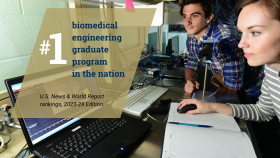Year 1
Admitted to Georgia Tech
- Responsible Conduct of Research requirement within first 90 days (online)
- Read Thesis and Dissertation Manual
- Advisor Preference Form
- Advisor - Student Financial Agreement Form
- Program of Study (Nov. 1)
- Qualifying Exam Mutual Expectations Document and Rubric
- Academic Background, Mutual Expectations + Honor Pledge (April 1)
Year 2
Qualifying Exam & Teaching Assistantship
- Qualifying Exam (scheduled Aug. 1 – Nov. 1)
- Example Qualifying Exam Written Document can be found here under Year 2
- Ensure all Committee members complete the Graduate Milestone Evaluation Form
- Teaching Assistantship
- TA forms can be accessed through this App
Year 3
Ph.D. Candidacy
- Thesis Committee Approval
- Ph.D. Proposal
- Example Proposals can be found here under Year 3
- Announcement
- Ensure all Committee members complete the Graduate Milestone Evaluation Form
- Admission to Ph.D. Candidacy
Year 4
Deadline to be Admitted to Ph.D. Candidacy (Sept. 15)
Year 4+
Graduation Requirements
- Ph.D. Defense
- Announcement
- Ensure all Committee members complete the Graduate Milestone Evaluation Form
- Complete Georgia Tech Thesis and Graduation Requirements
- Complete Emory Requirements









